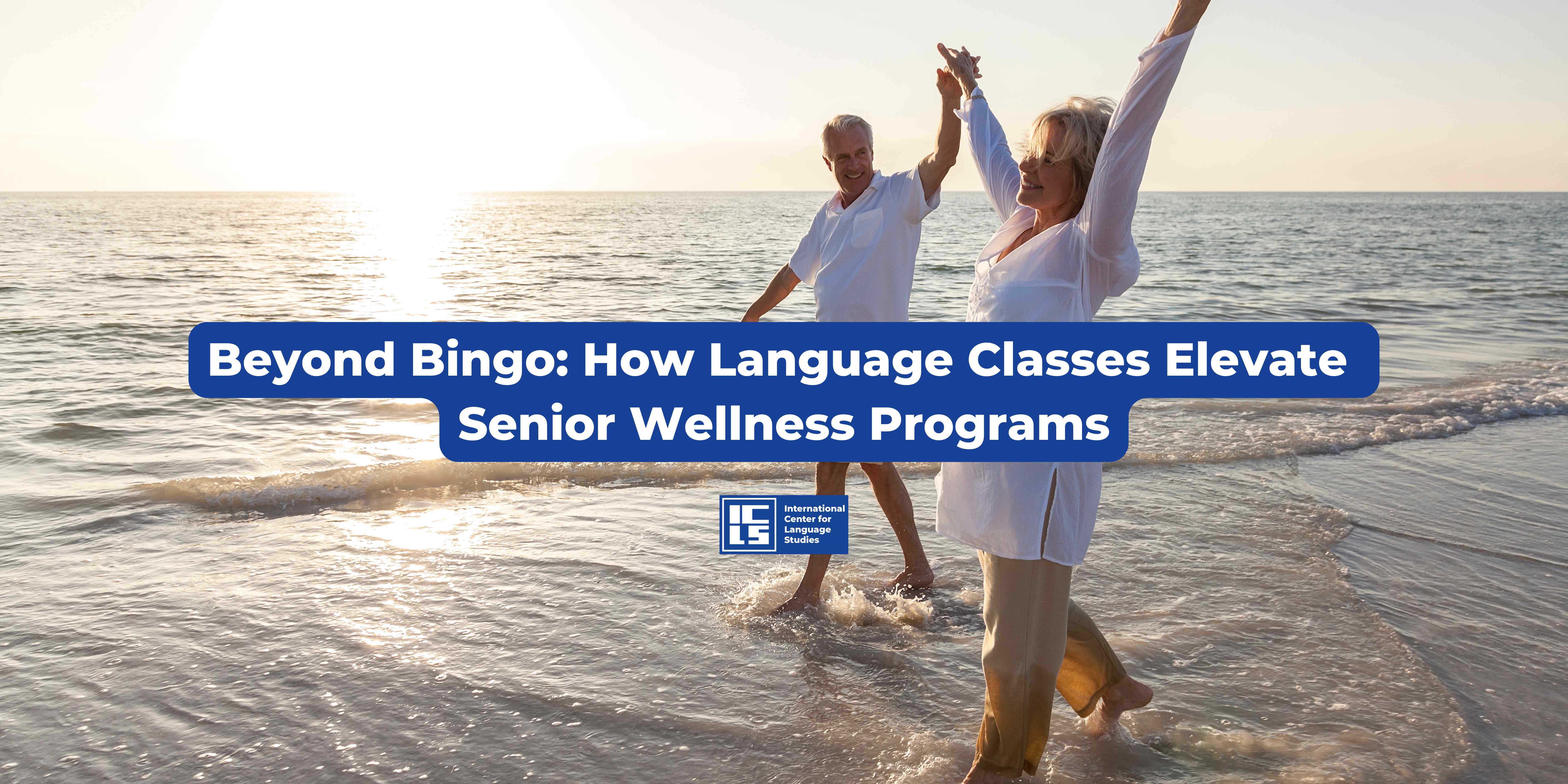Beyond Bingo: How Language Classes Elevate Senior Wellness Programs

A New Generation, A New Expectation
In many active adult communities, traditional programming has centered around game nights, arts and crafts, gentle fitness, and a few mental stimulation activities like crossword puzzles or trivia. While these activities for retirement homes have provided entertainment and routine, they no longer meet the expectations of today’s aging adults.
Baby Boomers—now in their 70s and early 80s—are living longer, staying healthier, and redefining what it means to grow older. This generation is “working longer, staying physically active, and looking for meaningful social and intellectual stimulation” well into later life. They’re not satisfied with passive content or a free puzzle app—they’re seeking challenge, purpose, and connection.
This generational shift demands a transformation in senior wellness programs. It’s no longer enough to offer routine games or solitary apps. Modern residents want engaging classes for senior citizens that support lifelong learning, build community, and promote real cognitive growth. Language learning is emerging as a powerful solution—offering both intellectual stimulation and rich social engagement.
Rethinking Engagement: No More Age Boxes
Residents of active adult communities aren’t there because they need care—they’re there because they want connection. Many are retired professionals, creatives, or lifelong learners who are just as committed to staying mentally sharp as they are to maintaining physical health.
To serve these residents well, community offerings must move beyond outdated assumptions. Ageist thinking—like assuming older adults prefer low-effort activities or aren’t capable of learning new skills—misses the mark. In fact, studies show that older adults thrive when intellectually challenged, particularly in group settings that foster mutual support and curiosity (Levy, 2017).
Language classes send a powerful message: “We see you as capable, curious, and still growing.” This is not about remedial activity—it’s about recognizing and celebrating residents’ continued desire to grow.
Language Learning: A Workout for the Aging Brain
Just as physical exercise supports mobility, cognitive engagement is essential for maintaining brain health. Language learning is one of the most effective and enjoyable brain exercises for memory improvement, activating key areas related to memory, attention, reasoning, and executive function (Bak et al., 2014).
Unlike simple puzzles, language classes require real-time multitasking—listening, speaking, reading, and writing. That makes them one of the most comprehensive mental stimulation activities available.
Research supports this: bilingual individuals show a delayed onset of dementia by up to 4.5 years compared to monolinguals (Bialystok et al., 2007). Other studies confirm that learning a new language in later life significantly boosts executive function, which governs planning, focus, and decision-making.
More than just mental training, language classes are fun, empowering, and deeply social—making them ideal for enriching residents’ daily lives.
Why Brain Apps Aren’t Enough
Brain-training apps may seem like a convenient solution, but their benefits are narrow. While they can improve performance on specific tasks, studies show little evidence that these gains extend to real-world cognitive function. A 2016 NIH-funded study concluded that such apps rarely lead to meaningful cognitive improvements (Simons et al., 2016).
Even more importantly, apps are inherently solitary. They lack the community, conversation, and connection that are critical to older adults’ well-being. Senior wellness programs must prioritize options that support the whole person—not just their screen time.
Community and Connection
Social engagement is one of the most powerful tools for healthy aging. It protects against cognitive decline and reduces risk of depression (Fratiglioni et al., 2004). Unlike solitary puzzles or apps, language classes are inherently communal. They give residents a reason to gather, converse, and support one another.
Well-designed classes for senior citizens often take a slower, conversational approach that’s both accessible and fun. Instructors use music, humor, and real-life scenarios to bring the language to life. The goal isn’t fluency—it’s engagement. Even basic phrases can spark joy, confidence, and connection.
A Clear Differentiator in a Competitive Market
In a landscape where many communities offer similar layouts and amenities, programming is often the true differentiator. Innovative, high-impact experiences—like language classes—set your community apart in a lasting and meaningful way.
These offerings are not feel-good extras; they’re strategic investments in your brand. When prospective residents and their families compare communities, unique, purpose-driven programming often tips the scale. In a market where occupancy is high, but competition is higher, dynamic programs offer a lasting competitive advantage.
A Smart, Scalable Solution
Looking to introduce language learning into your community? Consider partnering with a provider like ICLS (International Center for Language Studies). ICLS offers its Lifelong Language program—live, online, instructor-led classes specifically designed for older adults. With courses in French, Spanish, and Italian (and more languages to come), these real-time sessions bring residents together for active learning and genuine fun—all from the comfort of their own homes or community spaces.
What sets ICLS apart is its custom curriculum, built around conversational speaking practice and real-world themes that resonate with older learners—like food, travel, family, and hobbies. This approach keeps classes relevant, engaging, and immediately rewarding, fostering both confidence and connection among participants.
Unlike app-based solutions or pre-recorded videos, ICLS classes are interactive, adaptable, and exclusively reserved for members of your community. That means residents learn together, form bonds, and enjoy an experience tailored just for them. These classes integrate seamlessly into any senior wellness program committed to holistic, person-centered enrichment.
Even better, setup is effortless: the adult community simply purchases the class they want and informs their residents—we take care of everything else. It’s a true white-glove service designed to make language learning seamless and stress-free.
Final Thoughts
Today’s residents want more than bingo—they want growth. Language classes offer more than vocabulary—they offer cognitive challenge, meaningful connection, and renewed purpose.
For forward-thinking communities, offering language learning is more than a trend—it’s a chance to lead. It redefines aging not as a slow decline, but as a vibrant, evolving chapter filled with curiosity, confidence, and community.
Get in touch with ICLS today and bring engaging, stress-free language learning to your community.
References
- Bialystok, E., Craik, F. I. M., & Freedman, M. (2007). Bilingualism as a protection against the onset of symptoms of dementia. Neuropsychologia, 45(2), 459–464.
- Antoniou, M., Gunasekera, G. M., & Wong, P. C. M. (2013). Foreign language training as cognitive therapy for age-related cognitive decline: A hypothesis for future research. Neuroscience & Biobehavioral Reviews, 37(10), 2689–2698
- Bak, T. H., Nissan, J. J., Allerhand, M. M., & Deary, I. J. (2014). Does bilingualism influence cognitive aging? Annals of Neurology, 75(6), 959–963.
- California State University, Northridge. Baby Boomers Are Redefining What It Means to Be ‘Old,’ Says CSUN Prof. https://csunshinetoday.csun.edu/media-releases/baby-boomers-are-redefining-what-it-means-to-be-old-says-csun-prof/. Northridge, CA. Published June 2023.
- Fratiglioni, L., Paillard-Borg, S., & Winblad, B. (2004). An active and socially integrated lifestyle in late life might protect against dementia. The Lancet Neurology, 3(6), 343–353.
- ICLS blog. Exercise Your Brain with Language Learning. https://www.icls.edu/blog/exercise-your-brain-with-language-learning. Washington, DC. Published February 26, 2024
- ICLS blog. Why Language Learning Is One of (If Not the) Best Hobbies for Retirees. https://www.icls.edu/blog/why-language-learning-is-one-of-if-not-the-best-hobbies-for-retirees. Washington, DC. Published October 9, 2024.
- Levy, B. R. (2017). Mind Matters: Cognitive and Physical Effects of Age Stereotypes. Current Directions in Psychological Science, 26(6), 582–588.
- Simons, D. J., et al. (2016). Do “Brain-Training” Programs Work? Psychological Science in the Public Interest, 17(3), 103–186.
- Stepping Up for Seniors. Beyond Bingo: Innovative Activities for Senior Centers. https://steppingupforseniors.org/beyond-bingo-innovative-activities-for-senior-centers/. Scottsdale, AZ. Accessed July 28, 2025.


